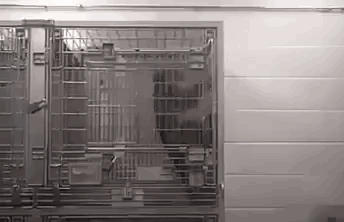| Aaaaaaa— This is what it looks like when a monkey loses his or her mind:  Rocking back and forth, repetitively pacing, and lashing out—these are just some of the signs of mental deterioration among the gentle, sensitive monkeys that PETA investigators found at the University of Pittsburgh (Pitt). They spend their lonely days imprisoned in tiny, barren metal cages until they're taken to be tormented in painful, frightening experiments. We're doing all that we can to stop this abuse, but to strengthen our groundbreaking investigations and campaigns against animal testing, we need you to step up now, while you can make the most impact. Will you help spare monkeys and other animals trapped in laboratories misery and suffering? Make a gift to PETA's Animals Out (of the Labs) Matching-Gift Challenge right now and it will be DOUBLED! Even just $5 helps—and you'll get a free sticker to show your support for animals. Investigators documented many more animals suffering in Pitt's laboratories:
With the help of kind people like you, we're working to end the cruelty in Pitt's laboratories. After protests by PETA and our supporters, the National Institutes of Health didn't renew funding for Aneja for the first time in a decade—meaning that he can no longer condemn mice to die slowly and painfully in sepsis experiments. But many more animals are still confined at Pitt and countless other laboratories around the world, and we need more support to keep up the pressure. Will you give now for lonely, tormented animals trapped in laboratories? Donate $5 or more now to PETA's Animals Out (of the Labs) Matching-Gift Challenge and your gift will double in impact—and you'll get a free sticker!  PETA has been at the forefront of the movement to abolish animal testing for decades, and we're making tremendous progress. If we meet our $500,000 goal by the October 31 deadline, we'll have $1 million to help all animals who are suffering today at the hands of experimenters. If everyone pitches in—everyone who cares about animals, whose heart is broken by the thought of lonely monkeys being driven to lose their minds in a barren cage—we can help make testing on animals a thing of the past. But that means we need your assistance right now, Aaaaaaa. Thank you for your compassion and for helping us move toward a future in which no animal is abused or killed in a laboratory. | ||||||
| This e-mail was sent to sajanram.shrestha@blogger.com. Please let us know if you'd prefer that we use a different e-mail address. Want to get more active for animals? Sign up to receive additional updates about PETA's work through our subscription page. You can also choose to receive fewer e-mails or unsubscribe if you're absolutely certain that you want to become less involved in our work for animals. This e-mail was sent by PETA, 501 Front St., Norfolk, VA 23510 USA. | ||||||


No comments:
Post a Comment